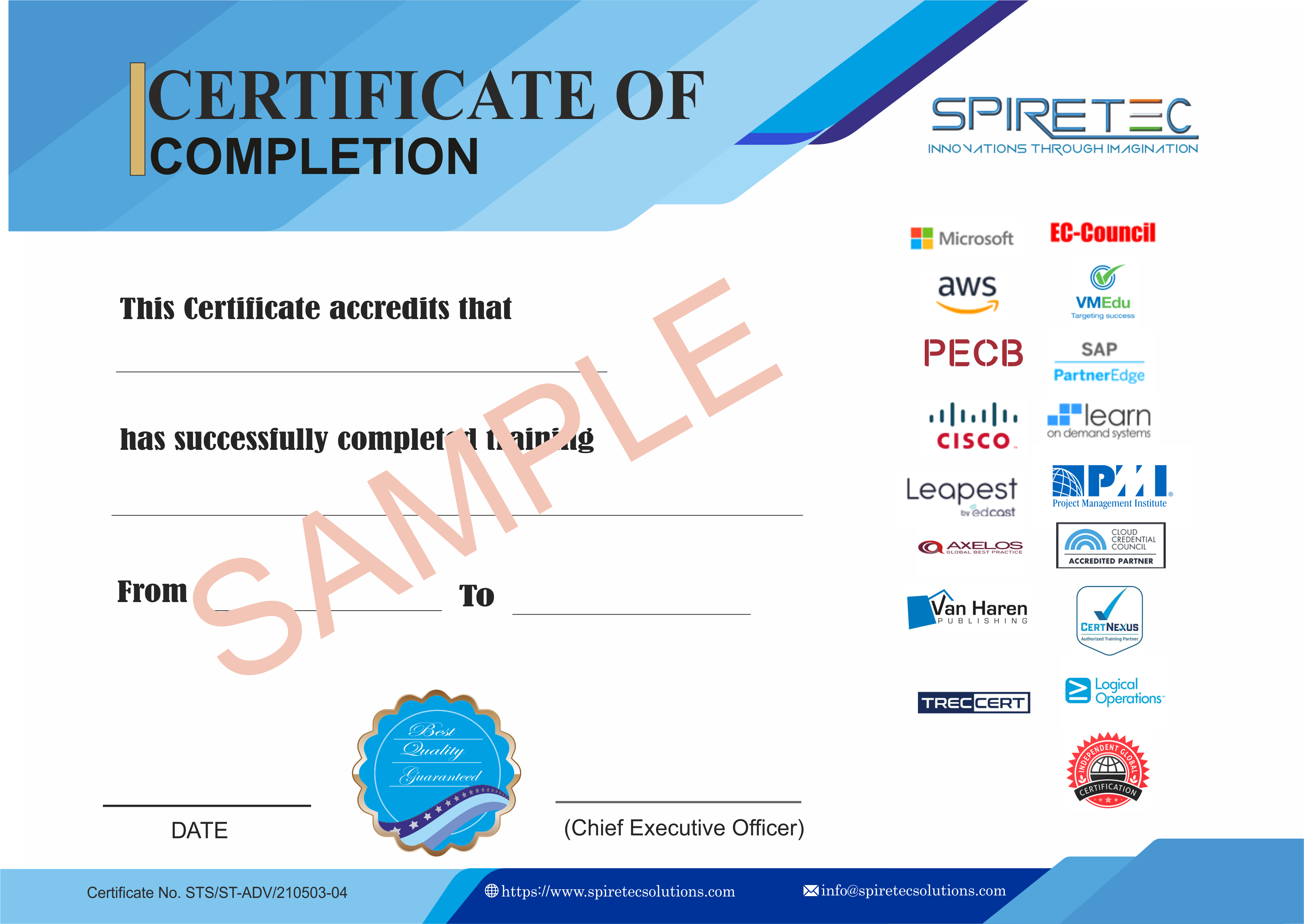The AWS Certified Solutions Architect – Professional course, centered on Advanced Architecting on AWS, is designed for professionals looking to deepen their expertise in designing scalable, reliable, and highly available systems on the AWS platform. This course covers advanced techniques and best practices to optimize and architect AWS cloud deployments. Participants will delve into core architecting concepts, manage multiple AWS accounts, connect on-premises data centers to AWS, and secure data using encryption.
Key topics include advanced networking, specialized infrastructure, containerization with ECS and EKS, Continuous Integration/Continuous Delivery (CI/CD) pipelines, DDoS protection strategies, and large-scale data store management. Additionally, the course addresses workload migration, cost optimization, and architecting for edge locations. Upon completing the course and earning the AWS professional certification, learners will be equipped to design complex AWS solutions, making them invaluable assets in their professional roles. The hands-on labs and exercises reinforce theoretical principles, ensuring practical knowledge application.
Course Prerequisites:
To fully benefit from the AWS Certified Solutions Architect – Professional (Advanced Architecting on AWS) course, the following prerequisites are recommended:
-
Working knowledge of distributed systems and multi-tier architectures.
-
Familiarity with AWS core services such as EC2, S3, VPC, IAM, and CloudFormation.
-
Experience with AWS deployment and management services.
-
Understanding of network technologies related to AWS.
-
Knowledge of security concepts with hands-on experience in implementing security controls and compliance requirements.
-
Completion of the Architecting on AWS course or equivalent experience.
-
AWS Certified Solutions Architect - Associate certification or equivalent skills.
These prerequisites ensure that learners are well-prepared to engage with the advanced concepts in the course and participate effectively in the hands-on labs.
Target Audience:
The AWS Certified Solutions Architect – Professional course is tailored for experienced professionals seeking to deepen their cloud architecture skills, including:
-
Solutions Architects
-
Cloud Architects
-
Technical Architects
-
IT Professionals with AWS experience
-
DevOps Engineers
-
Systems Engineers
-
Cloud Strategists
-
IT Project Managers
-
Network Architects
-
Security Analysts or Engineers
-
Data Architects
-
IT Managers focused on cloud infrastructure
-
Enterprise Architects
-
Application Architects
-
Software Engineers specializing in cloud applications and infrastructure
-
Professionals aiming for AWS Certified Solutions Architect - Professional certification
Learning Objectives:
Upon completing the AWS Certified Solutions Architect – Professional course, participants will be able to:
-
Apply core AWS best practices and the AWS Well-Architected Framework to create advanced architectures.
-
Manage and secure multiple AWS accounts, establishing cross-account access and permissions.
-
Architect hybrid environments to connect on-premises data centers with AWS services, optimizing for cost and performance.
-
Design and implement data transfer strategies to move large datasets into AWS, leveraging services like AWS DataSync and Storage Gateway.
-
Create robust, scalable storage solutions and understand the nuances of AWS data storage options.
-
Defend against DDoS attacks using AWS Shield and WAF, and implement advanced security measures such as encryption and secure data transfer mechanisms.
-
Optimize application performance using AWS services, caching mechanisms, and content delivery networks.
-
Utilize AWS container services such as Amazon ECS, Amazon EKS, and AWS Fargate for scalable, cost-effective containerized applications.
-
Implement a CI/CD pipeline using AWS CodePipeline and manage infrastructure as code with AWS CloudFormation StackSets.
-
Explore the economic aspects of AWS cloud, including cost management tools and optimizing spend across infrastructure.
Course Outline
Day 1
-
Module 1: Reviewing Architecting Concepts
-
Module 2: Single to Multiple Accounts
-
AWS Organizations for multi-account access and permissions
-
AWS SSO to simplify access and authentication across AWS accounts and third-party services
-
AWS Control Tower
-
Permissions, access, and authentication
-
Module 3: Hybrid Connectivity
-
AWS Client VPN authentication and control
-
AWS Site-to-Site VPN
-
AWS Direct Connect for hybrid public and private connections
-
Increasing bandwidth and reducing cost
-
Basic, high, and maximum resiliency
-
Amazon Route 53 Resolver DNS resolution
-
Module 4: Specialized Infrastructure
-
AWS Storage Gateway solutions
-
On-demand VMware Cloud on AWS
-
Extending cloud infrastructure services with AWS Outposts
-
AWS Local Zones for latency-sensitive workloads
-
Your 5G network with and without AWS Wavelength
-
Module 5: Connecting Networks
-
Simplifying private subnet connections
-
VPC isolation with a shared services VPC
-
Transit Gateway Network Manager and VPC Reachability Analyzer
-
AWS Resource Access Manager
-
AWS PrivateLink and endpoint services
-
Lab 2: Configuring Transit Gateways
Day 2
-
Module 6: Containers
-
Container solutions compared to virtual machines
-
Docker benefits, components, solutions architecture, and versioning
-
Container hosting on AWS to reduce cost
-
Managed container services: Amazon ECS and Amazon EKS
-
AWS Fargate
-
Lab 3: Deploying an Application with Amazon ECS on Fargate
-
Module 7: Continuous Integration/Continuous Delivery (CI/CD)
-
CI/CD solutions and impact
-
CI/CD automation with AWS CodePipeline
-
Deployment models
-
AWS CloudFormation StackSets to improve deployment management
-
Module 8: High Availability and DDoS Protection
-
Common DDoS attacks layers
-
AWS WAF
-
AWS WAF web access control lists (ACLs), real-time metrics, logs, and security automation
-
AWS Shield Advanced services and AWS DDoS Response Team (DRT) services
-
AWS Network Firewall and AWS Firewall Manager to protect accounts at scale
-
Module 9: Securing Data
-
What cryptography is, why you would use it, and how to use it
-
AWS KMS
-
AWS CloudHSM architecture
-
FIPS 140-2 Level 2 and Level 3 encryption
-
Secrets Manager
-
Module 10: Large-Scale Data Stores
-
Amazon S3 data storage management including storage class, inventory, metrics, and policies
-
Data lake vs. data warehouse: Differences, benefits, and examples
-
AWS Lake Formation solutions, security, and control
-
Lab 4: Setting Up a Data Lake with Lake Formation
Day 3
-
Module 11: Large-Scale Applications
-
What edge services are and why you would use them
-
Improve performance and mitigate risk with Amazon CloudFront
-
Lambda@Edge
-
AWS Global Accelerator: IP addresses, intelligent traffic distribution, and health checks
-
Lab 5: Migrating an On-Premises NFS Share Using AWS DataSync and Storage Gateway
-
Module 12: Optimizing Cost
-
On-premises and cloud acquisition/deprecation cycles
-
Cloud cost management tools including reporting, control, and tagging
-
Examples and analysis of the five pillars of cost optimization
-
Module 13: Migrating Workloads
-
Business drivers and the process for migration
-
Successful customer practices
-
The 7 Rs to migrate and modernize
-
Migration tools and services from AWS
-
Migrating databases and large data stores
-
AWS Schema Conversion Tool (AWS SCT)
-
Module 14: Capstone Project
-
Use the Online Course Supplement (OCS) to review use cases, investigate data, and answer architecting design questions about Transit Gateway, hybrid connectivity, migration, and cost optimization







 Live Online Training (Duration : 24 Hours)
Live Online Training (Duration : 24 Hours)
